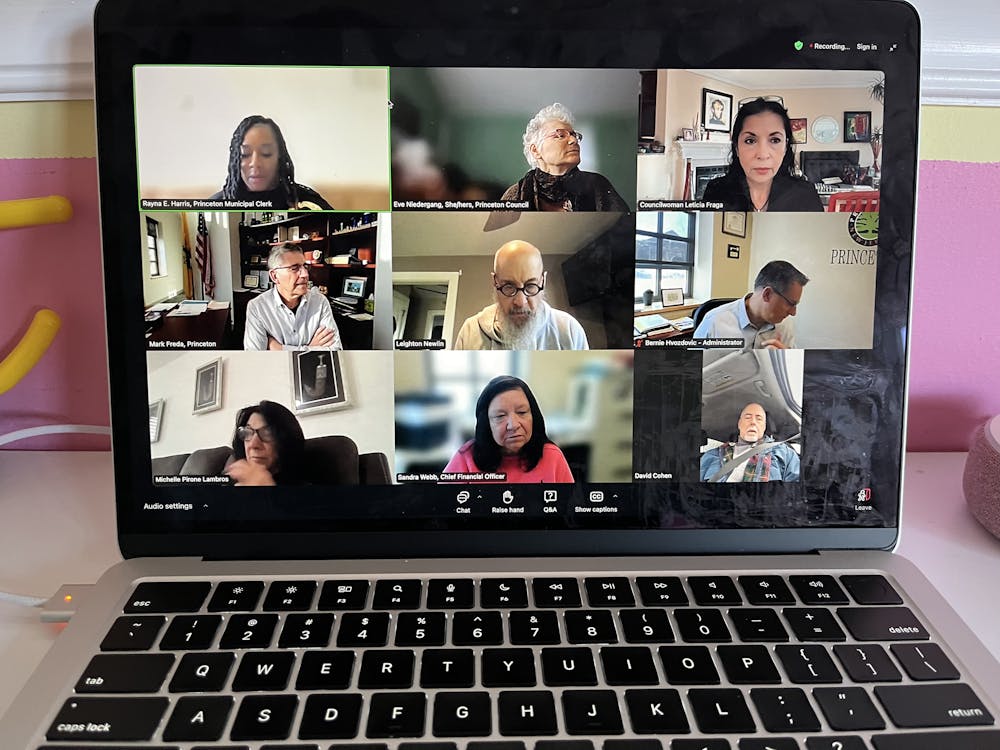After his one-year term in office, outgoing USG president Bruce Easop ’13 said that he is most proud of his efforts to start conversations about mental health around campus. The Mental Health Initiative, launched last March, was the first major project in a term that also included the launch of TigerDeals, the first ever Princeton Restaurant Week, the release of the COMBO III survey and the expansion of gender-neutral housing.
“People at Princeton many times have a tendency, myself included, to give the impression that everything is going perfectly — that everything is successful. When in reality, behind the scenes, you’re kind of paddling under the water, trying to keep up — whether with classes, with extracurriculars, we take on a lot,” Easop explained.
Easop was elected USG president after defeating former USG vice president Catherine Ettman ’13 in a runoff election in which he won by a small 82-vote margin. He lost to Ettman in the first round by more than 300 votes.
Prior to his term as USG president, Easop served one year on the USG as Class of 2013 senator. Easop replaced Michael Yaroshefsky ’12, who was the first sophomore to be elected USG president since 1993 and who was reelected for a second term in office with an overwhelming majority of the vote in his junior year.
Outgoing USG vice president Stephen Stolzenberg ’13 described Yaroshefsky as a “type-A” person, one who could be “commanding” at times. In contrast, he described Easop as a “democratic, compassionate” figure. Stolzenberg explained that the two leaders had very different methods in making decisions but maintained that both leaders were effective in creating a strong student government.
As class senator, Easop promoted student health with the Mental Health Initiative — a movement designed to increase awareness of the availability of resources on campus and to encourage students to get help when they need it. As president, he began a USG project to set up Mental Health Awareness Week on campus. Easop said that through his involvement with the COMBO III survey and personal conversations he had had with other students, he saw a need for larger discussions regarding mental health on campus.
“My hope with Mental Health Week was to start a dialogue,” Easop explained. He said that he received much positive feedback from the event but that he hopes for the event to produce a “long-term impact” on students. There will be a second Mental Health Awareness Week held from Feb. 25 to March 1.
Associate Dean of Undergraduate Students Thomas Dunne explained that Easop’s approach to the Mental Health Initiative explored mental health as an issue important to all Princetonians. Dunne said that Easop was specifically concerned with eliminating the stigma attached to issues of mental health and encouraging students to explore the resources available to them in cases in which they do need professional help.
Beyond Mental Health Week, Easop also spearheaded a movement to encourage and allow members of the general student body to apply for committees that were formerly more exclusive, according to outgoing U-Council chair Hae Bin Kim ’13. She said that Easop’s biggest achievement was to bring more opportunities to students on campus, citing Easop’s work in opening up the application process for the Priorities Committee and the Presidential Search Committee to students as concrete examples.
The USG president is usually asked to be a member of the Presidential Search Committee in years when the University is searching for new leadership, University Vice President and Secretary Robert Durkee ’69 said. However, outgoing Class of 2013 senator Andrew Blumenfeld ’13 said that Easop refused the offer to serve on the committee in an effort to give seniors the chance to apply for the position.
“That’s the sort of thing he does pretty regularly. He is very genuine in his efforts,” Blumenfeld said.
Durkee said Easop’s efforts to select candidates for student representatives on the Presidential Search Committee were “comprehensive and thoughtful,” producing “first-grade” suggestions.

“I was very impressed that he chose not to serve [on the committee] himself,” Durkee added.
Dunne described Easop as someone who “never needed to be the loudest voice in the room.” Dunne said that Easop’s leadership style was different because while he was a quieter person, he was also very reliable.
“He was the guy who would show up for volunteer events, stay the latest, work the hardest,” Dunne explained.
Easop explained that discussion within the USG, with the administration and with students was always ongoing.
“One of the biggest roles of the USG president is as a communicator. There is always discussion that is ongoing. Email becomes your biggest friend,” Easop said.
Outgoing USG social chair Benedict Wagstaff ’14 described the highlight of Easop’s administration as his efforts to make the USG much more approachable and accessible to the student body. Wagstaff praised Easop for his efforts to increase the conversations going on between the organization and students and his success in making students feel comfortable talking directly to the USG about their opinions and ideas.
“Within the USG, he made people feel valued — that their projects meant something, and he tried to see each of us make the most of what we were doing,” Wagstaff explained.
Stolzenberg said he commends Easop for his ability to create an atmosphere where new USG members could grow and where older members could effectively accomplish goals that they had begun.
“Bruce and I are very similar in the way we interact. We know what the other person is thinking. We rarely disagreed in what we did,” Stolzenberg said. Stolzenberg noted that one failure that he saw from Easop’s administration was Easop’s tendency to do much more on his own, rather than delegating that work to others.
“In a role like this, it really comes before your school work,” Easop said. Easop said that while he easily spent 30 to 40 hours on USG work each week — just as much as one would spend on a full-time job — the experience was truly rewarding.
Newly elected USG president Shawon Jackson ’15 will lead the USG this year, after having defeated Wagstaff by a small 86-vote margin, earning 51.9 percent of the vote.
“If Shawon continues to maintain the high quality that was seen under Bruce’s administration, the USG will continue to thrive,” Wagstaff said.








